Related Research Articles

Welsh is a Celtic language of the Brittonic subgroup that is native to the Welsh people. Welsh is spoken natively in Wales, by some in England, and in Y Wladfa. Historically, it has also been known in English as "British", "Cambrian", "Cambric" and "Cymric".
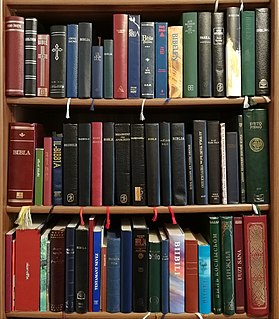
The Bible has been translated into many languages from the biblical languages of Hebrew, Aramaic and Greek. As of September 2020 the full Bible has been translated into 704 languages, the New Testament has been translated into an additional 1,551 languages and Bible portions or stories into 1,160 other languages. Thus at least some portions of the Bible have been translated into 3,415 languages.
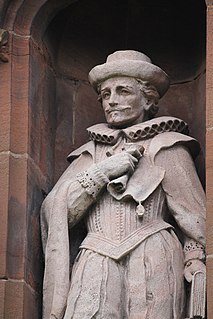
William Salesbury also Salusbury was the leading Welsh scholar of the Renaissance and the principal translator of the 1567 Welsh New Testament.
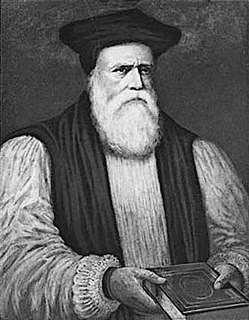
William Morgan was Bishop of Llandaff and of St Asaph, and the translator of the first version of the whole Bible into Welsh from Greek and Hebrew.
This article contains information about the literary events and publications of 1548.

The British and Foreign Bible Society, often known in England and Wales as simply the Bible Society, is a non-denominational Christian Bible society with charity status whose purpose is to make the Bible available throughout the world.
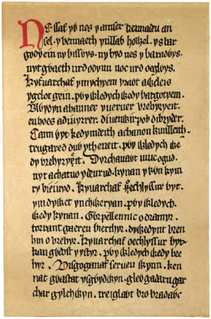
The Red Book of Hergest is a large vellum manuscript written shortly after 1382, which ranks as one of the most important medieval manuscripts written in the Welsh language. It preserves a collection of Welsh prose and poetry, notably the tales of the Mabinogion and Gogynfeirdd poetry. The manuscript derives its name from the colour of its leather binding and from its association with Hergest Court between the late 15th and early 17th century.

The National Library of Wales, Aberystwyth, is the national legal deposit library of Wales and is one of the Welsh Government sponsored bodies. It is the biggest library in Wales, holding over 6.5 million books and periodicals, and the largest collections of archives, portraits, maps and photographic images in Wales. The Library is also home to the national collection of Welsh manuscripts, the National Screen and Sound Archive of Wales, and the most comprehensive collection of paintings and topographical prints in Wales. As the primary research library and archive in Wales and one of the largest research libraries in the United Kingdom, the National Library is a member of Research Libraries UK (RLUK) and the Consortium of European Research Libraries (CERL).

Richard Davies was a Welsh bishop and scholar.

Parts of the Bible have been translated into Welsh since at least the 15th century, but the most widely used translation of the Bible into Welsh for several centuries was the 1588 translation by William Morgan, Y Beibl cyssegr-lan sef Yr Hen Destament, a'r Newydd as revised in 1620. The Beibl Cymraeg Newydd was published in 1988 and revised in 2004. Beibl.net is a translation in colloquial Welsh which was completed in 2013.

Christianity is the largest religion in Wales. Wales has a strong tradition of nonconformism, particularly Methodism. Until 1920 the established church was the Church of England, but from 1920 the disestablished Church in Wales, still Anglican, was self-governing.
This article is about the particular significance of the century 1501–1600 to Wales and its people.

Thomas Huet was a Welsh clergyman and translator of the Bible.

Welsh-language literature has been produced continuously since the emergence of Welsh from Brythonic as a distinct language in around the 5th century AD. The earliest Welsh literature was poetry, which was extremely intricate in form from its earliest known examples, a tradition sustained today. Poetry was followed by the first British prose literature in the 11th century. Welsh-language literature has repeatedly played a major part in the self-assertion of Wales and its people. It continues to be held in the highest regard, as evidenced by the size and enthusiasm of the audiences attending the annual National Eisteddfod of Wales, probably the largest amateur arts festival in Europe, which crowns the literary prize winners in a dignified ceremony.
Humphrey Toy was a British bookseller and publisher, and the son of bookseller Robert Toy. In 1567, he published the first translation of New Testament in Welsh from the original Greek, translated by his close friend William Salesbury. Along with the Bible, Toy published the first translation of the Book of Common Prayer in Welsh, also translated by Salesbury.
Christianity is the majority religion in Wales. From 1534 until 1920 the established church was the Church of England, but this was disestablished in Wales in 1920, becoming the still Anglican but self-governing Church in Wales. Wales also has a strong tradition of nonconformism and Methodism.
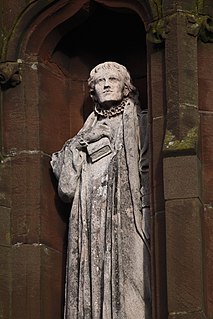
Edmund (Edmwnd) Prys was a Welsh clergyman and poet, best known for Welsh metrical translations of the Psalms in his Salmau Cân.
Isaac Jones (1804–1850) was a Welsh cleric and translator.
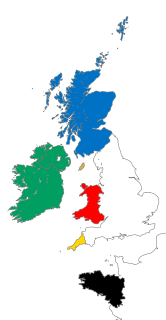
In addition to English, literature has been written in a wide variety of other languages in Britain, that is the United Kingdom, the Isle of Man and the Channel Islands. This includes literature in Scottish Gaelic, Welsh, Latin, Cornish, Anglo-Norman, Guernésiais, Jèrriais, Manx, and Irish. Literature in Anglo-Saxon is treated as English literature and literature in Scots as Scottish literature.

Y Beibl cyssegr-lan sef Yr Hen Destament, a'r Newydd, by William Morgan, was the first complete translated version of the Bible to appear in Welsh in 1588.
References
- ↑ "Llyfrgell Genedlaethol Cymru - The National Library of Wales: William Salesbury's New Testament". www.library.wales. Retrieved 2018-05-08.